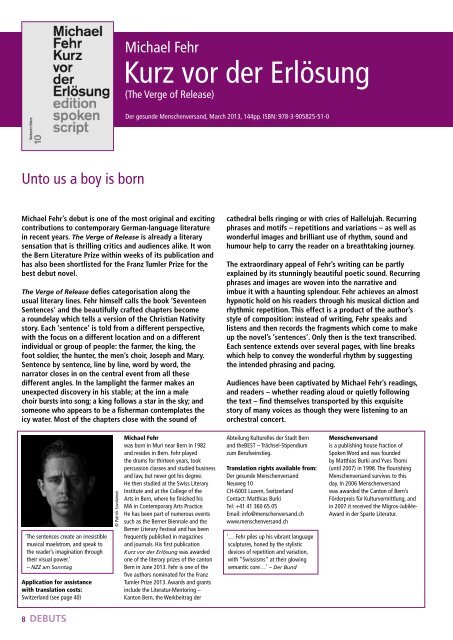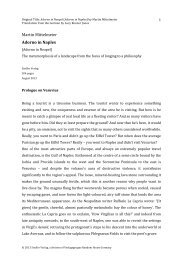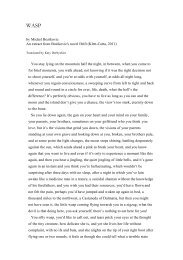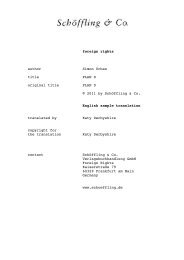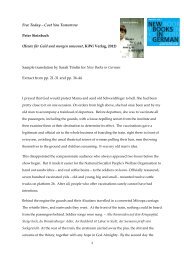issue 34 - New Books in German
issue 34 - New Books in German
issue 34 - New Books in German
You also want an ePaper? Increase the reach of your titles
YUMPU automatically turns print PDFs into web optimized ePapers that Google loves.
Michael Fehr<br />
Kurz vor der Erlösung<br />
(The Verge of Release)<br />
Der gesunde Menschenversand, March 2013, 144pp. ISBN: 978-3-905825-51-0<br />
Unto us a boy is born<br />
Michael Fehr’s debut is one of the most orig<strong>in</strong>al and excit<strong>in</strong>g<br />
contributions to contemporary <strong>German</strong>-language literature<br />
<strong>in</strong> recent years. The Verge of Release is already a literary<br />
sensation that is thrill<strong>in</strong>g critics and audiences alike. It won<br />
the Bern Literature Prize with<strong>in</strong> weeks of its publication and<br />
has also been shortlisted for the Franz Tumler Prize for the<br />
best debut novel.<br />
The Verge of Release defies categorisation along the<br />
usual literary l<strong>in</strong>es. Fehr himself calls the book ‘Seventeen<br />
Sentences’ and the beautifully crafted chapters become<br />
a roundelay which tells a version of the Christian Nativity<br />
story. Each ‘sentence’ is told from a different perspective,<br />
with the focus on a different location and on a different<br />
<strong>in</strong>dividual or group of people: the farmer, the k<strong>in</strong>g, the<br />
foot soldier, the hunter, the men’s choir, Joseph and Mary.<br />
Sentence by sentence, l<strong>in</strong>e by l<strong>in</strong>e, word by word, the<br />
narrator closes <strong>in</strong> on the central event from all these<br />
different angles. In the lamplight the farmer makes an<br />
unexpected discovery <strong>in</strong> his stable; at the <strong>in</strong>n a male<br />
choir bursts <strong>in</strong>to song; a k<strong>in</strong>g follows a star <strong>in</strong> the sky; and<br />
someone who appears to be a fisherman contemplates the<br />
icy water. Most of the chapters close with the sound of<br />
cathedral bells r<strong>in</strong>g<strong>in</strong>g or with cries of Hallelujah. Recurr<strong>in</strong>g<br />
phrases and motifs – repetitions and variations – as well as<br />
wonderful images and brilliant use of rhythm, sound and<br />
humour help to carry the reader on a breathtak<strong>in</strong>g journey.<br />
The extraord<strong>in</strong>ary appeal of Fehr’s writ<strong>in</strong>g can be partly<br />
expla<strong>in</strong>ed by its stunn<strong>in</strong>gly beautiful poetic sound. Recurr<strong>in</strong>g<br />
phrases and images are woven <strong>in</strong>to the narrative and<br />
imbue it with a haunt<strong>in</strong>g splendour. Fehr achieves an almost<br />
hypnotic hold on his readers through his musical diction and<br />
rhythmic repetition. This effect is a product of the author’s<br />
style of composition: <strong>in</strong>stead of writ<strong>in</strong>g, Fehr speaks and<br />
listens and then records the fragments which come to make<br />
up the novel’s ‘sentences’. Only then is the text transcribed.<br />
Each sentence extends over several pages, with l<strong>in</strong>e breaks<br />
which help to convey the wonderful rhythm by suggest<strong>in</strong>g<br />
the <strong>in</strong>tended phras<strong>in</strong>g and pac<strong>in</strong>g.<br />
Audiences have been captivated by Michael Fehr’s read<strong>in</strong>gs,<br />
and readers – whether read<strong>in</strong>g aloud or quietly follow<strong>in</strong>g<br />
the text – f<strong>in</strong>d themselves transported by this exquisite<br />
story of many voices as though they were listen<strong>in</strong>g to an<br />
orchestral concert.<br />
‘The sentences create an irresistible<br />
musical maelstrom, and speak to<br />
the reader’s imag<strong>in</strong>ation through<br />
their visual power.’<br />
– NZZ am Sonntag<br />
Application for assistance<br />
with translation costs:<br />
Switzerland (see page 40)<br />
© Patrick Savola<strong>in</strong>en<br />
Michael Fehr<br />
was born <strong>in</strong> Muri near Bern <strong>in</strong> 1982<br />
and resides <strong>in</strong> Bern. Fehr played<br />
the drums for thirteen years, took<br />
percussion classes and studied bus<strong>in</strong>ess<br />
and law, but never got his degree.<br />
He then studied at the Swiss Literary<br />
Institute and at the College of the<br />
Arts <strong>in</strong> Bern, where he f<strong>in</strong>ished his<br />
MA <strong>in</strong> Contemporary Arts Practice.<br />
He has been part of numerous events<br />
such as the Berner Biennale and the<br />
Berner Literary Festival and has been<br />
frequently published <strong>in</strong> magaz<strong>in</strong>es<br />
and journals. His first publication<br />
Kurz vor der Erlösung was awarded<br />
one of the literary prizes of the canton<br />
Bern <strong>in</strong> June 2013. Fehr is one of the<br />
five authors nom<strong>in</strong>ated for the Franz<br />
Tumler Prize 2013. Awards and grants<br />
<strong>in</strong>clude the Literatur-Mentor<strong>in</strong>g –<br />
Kanton Bern, the Werkbeitrag der<br />
Abteilung Kulturelles der Stadt Bern<br />
and theBEST – Trächsel-Stipendium<br />
zum Berufse<strong>in</strong>stieg.<br />
Translation rights available from:<br />
Der gesunde Menschenversand<br />
Neuweg 10<br />
CH-6003 Luzern, Switzerland<br />
Contact: Matthias Burki<br />
Tel: +41 41 360 65 05<br />
Email: <strong>in</strong>fo@menschenversand.ch<br />
www.menschenversand.ch<br />
‘… Fehr piles up his vibrant language<br />
sculptures, honed by the stylistic<br />
devices of repetition and variation,<br />
with “Swissisms” at their glow<strong>in</strong>g<br />
semantic core…’ – Der Bund<br />
Menschenversand<br />
is a publish<strong>in</strong>g house fraction of<br />
Spoken Word and was founded<br />
by Matthias Burki and Yves Thomi<br />
(until 2007) <strong>in</strong> 1998. The flourish<strong>in</strong>g<br />
Menschenversand survives to this<br />
day. In 2006 Menschenversand<br />
was awarded the Canton of Bern’s<br />
Förderpreis für Kulturvermittlung, and<br />
<strong>in</strong> 2007 it received the Migros-Jubilée-<br />
Award <strong>in</strong> der Sparte Literatur.<br />
8 DEBUTS


